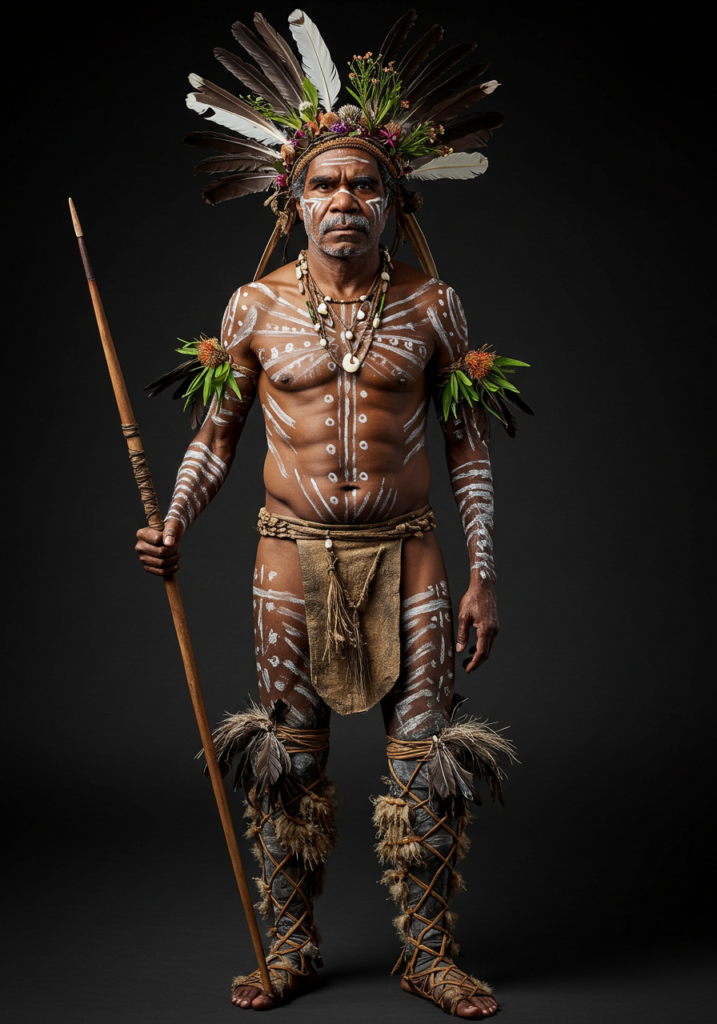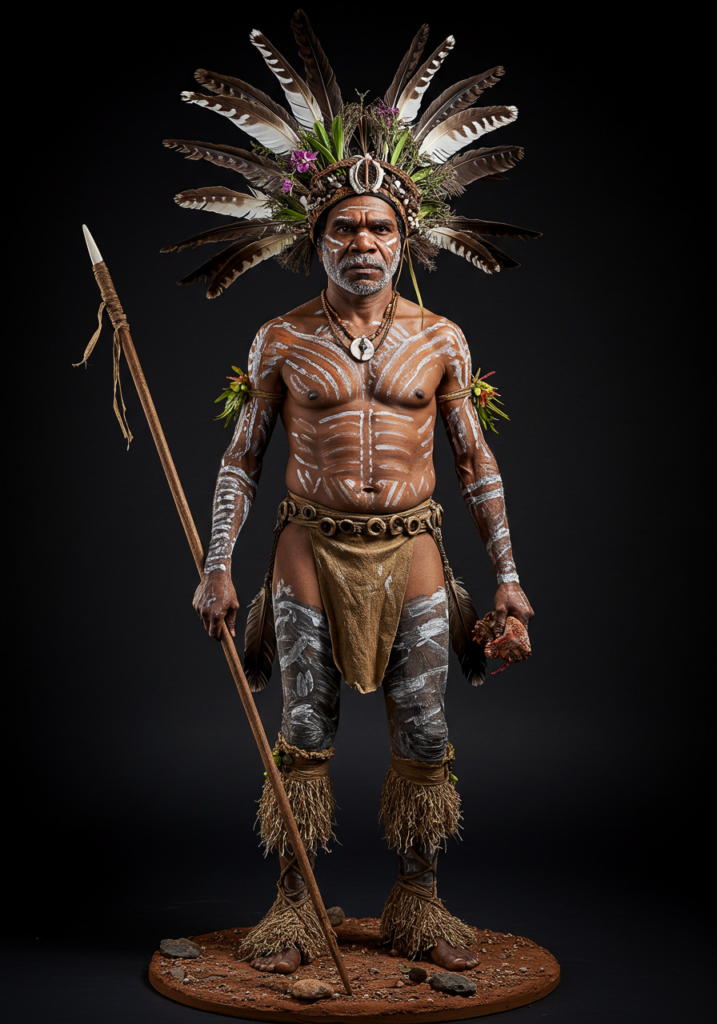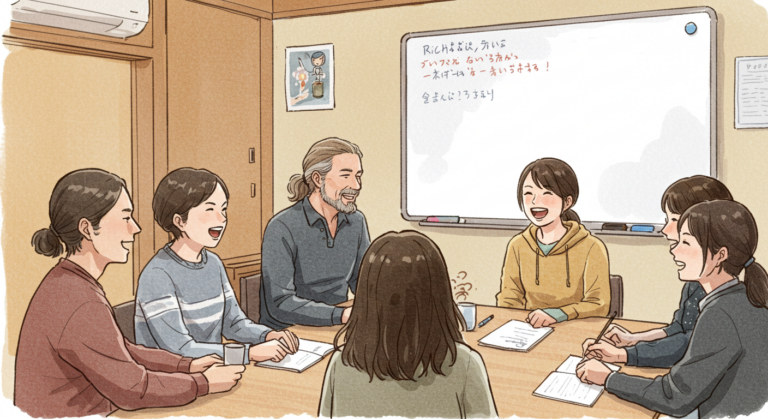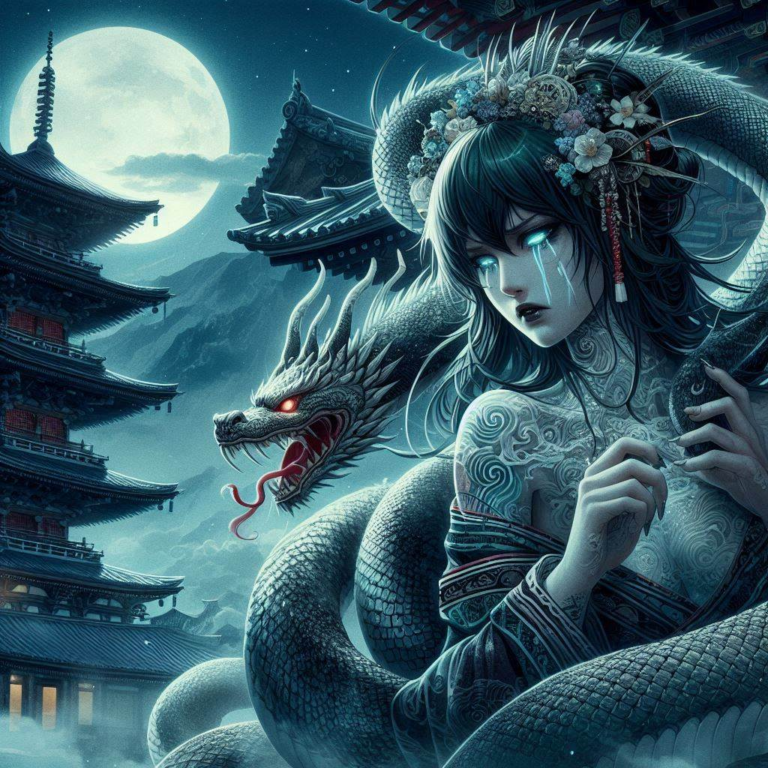Kadiatcha
A featherfoot or Kadiatcha man is a sorcerer×意味:
呪術師、妖術師。
文法:
- 'sorcerer' は名詞で、魔法を使う人を指します。
例:
The sorcerer cast a powerful spell.
その呪術師は強力な呪文を唱えた。
In many fantasy stories, a sorcerer is a character with magical abilities who uses them for good or evil purposes.
多くのファンタジー物語では、呪術師は魔法の力を持つキャラクターで、善または悪のためにそれらを使用します。 in Australian Aboriginal spirituality×意味:
精神性、霊性。
文法:
- 名詞で、宗教的または精神的な信念や実践を指します。
例:
Spirituality is important to many people.
精神性は多くの人々にとって重要です。
Aboriginal spirituality is deeply connected to the land and the Dreaming, encompassing ancestral beings and creation stories.
アボリジニの精神性は、土地とドリーミングに深く結びついており、祖先の存在や創造の物語を含んでいます。. A featherfoot is usually a bad spirit who kills people. In most traditional×意味:
伝統的な。
文法:
- 形容詞で、古くから伝わるものを指します。
例:
Traditional Aboriginal art is beautiful.
伝統的なアボリジニの芸術は美しいです。
Many cultures have traditional dances that are passed down through generations, often with specific meanings and rituals.
多くの文化には、世代から世代へと受け継がれる伝統的な踊りがあり、多くの場合、特定の意味や儀式があります。 Aboriginal beliefs×意味:
信条、考え。
文法:
- 名詞(複数形)'belief' の複数形
例:
His beliefs were strong.
彼の信条は強かった。
Cultural beliefs are often passed down from one generation to the next, shaping the way people see the world.
文化的な信条は、しばしば世代から世代へと受け継がれ、人々の世界の見方を形作ります。, there is no such thing as×意味:
〜というものはない。
文法:
- 存在を否定する表現。
- 'there is no such thing as' + 名詞
例:
There is no such thing as a perfect person.
完璧な人間など存在しない。
In some cultures, they believe there is no such thing as bad luck, only challenges to overcome.
いくつかの文化では、不運というものはなく、克服すべき課題しかないと信じられています。 a natural death×意味:
死。
文法:
- 名詞
例:
Death is a part of life.
死は人生の一部です。
The concept of death varies across cultures, with different beliefs about the afterlife and mourning rituals.
死の概念は文化によって異なり、死後の世界や追悼の儀式についてのさまざまな信念があります。. Every death is caused by×意味:
〜によって引き起こされる。
文法:
- 受動態の表現。
- 'be caused by' + 原因
例:
The fire was caused by lightning.
その火事は雷が原因だった。
Many diseases are caused by viruses or bacteria, which can spread through various means.
多くの病気はウイルスや細菌によって引き起こされ、さまざまな方法で広がります。 evil spirits×意味:
悪霊。
文法:
- 'evil'(邪悪な)+ 'spirit'(霊)
例:
Some people believe in evil spirits.
悪霊を信じる人もいる。
In some folklore, evil spirits are blamed for misfortune and illness, and rituals are performed to ward them off.
一部の民間伝承では、悪霊が不幸や病気の原因であるとされ、それらを追い払うための儀式が行われます。 or spells×意味:
呪文、まじない。
文法:
-名詞(複数形)'spell' の複数形
例:
The witch cast spells on people.
その魔女は人々に呪文をかけた。
In fantasy literature, spells are often used by wizards and witches to achieve magical effects.
ファンタジー文学では、呪文はしばしば魔法使いや魔女によって魔法の効果を達成するために使用されます。. It is usually because of an enemy×意味:
敵。
文法:
- 名詞
例:
He defeated his enemy.
彼は敵を倒した。
In many stories, the protagonist must overcome their enemy to achieve their goals.
多くの物語では、主人公は目標を達成するために敵を克服しなければなりません。, who wants revenge for×意味:
〜に復讐したがっている。
文法:
- 'want revenge for' + 理由
例:
The warrior wanted revenge for his father's death.
その戦士は父親の死の復讐を望んでいた。
He wanted revenge for the injustice he had suffered, so he plotted his return.
彼は自分が受けた不正に対する復讐を望んでいたので、復帰を計画しました。 something.
A featherfoot is so named because×意味:
〜なのでそう名付けられている。
文法:
- 'be named because' + 理由
例:
The bird is so named because of its red feathers.
その鳥は赤い羽を持っているのでそう名付けられています。
The town is so named because it was founded by a man named Smith.
その町はスミスという名前の男性によって設立されたため、そう名付けられました。 they are believed to have×意味:
〜を持っていると信じられている。
文法:
- 'be believed to have' + 特徴
例:
He is believed to have magical powers.
彼は魔法の力を持っていると信じられている。
The ancient artifact is believed to have healing properties, attracting many visitors to the museum.
その古代の遺物には治癒力があると信じられており、多くの訪問者が博物館に集まります。 supernatural powers×意味:
超能力、不思議な力。
文法:
- 'supernatural'(超自然的な)+ 'power'(力)
例:
Ghosts are said to have supernatural powers.
幽霊は超能力を持っていると言われています。
Many superheroes in comic books have supernatural powers, such as the ability to fly or become invisible.
漫画の多くのスーパーヒーローは、飛んだり、透明になったりするなどの超能力を持っています。, including×意味:
〜を含めて。
文法:
- 'including' + 例
例:
The price includes tax.
その価格は税込みです。
He has many talents, including singing, dancing, and playing multiple instruments.
彼には、歌、ダンス、複数の楽器の演奏など、多くの才能があります。 the ability to×意味:
〜する能力。
文法:
- 'the ability to' + 動詞
例:
Birds have the ability to fly.
鳥は飛ぶ能力を持っています。
Humans have the ability to reason and solve complex problems, which sets them apart from other animals.
人間には、推論して複雑な問題を解決する能力があり、それが他の動物とは異なります。 fly and move inter-dimensionaly×意味:
異次元間を。
文法:
- 副詞
例:
They traveled inter-dimensionally.
かれらは異次元間を移動した。
In science fiction, characters sometimes travel inter-dimensionally to explore parallel universes.
SFでは、キャラクターが並行宇宙を探索するために異次元間を移動することがあります。 when threatened×意味:
脅かされたとき。
文法:
- 'when' + 受動態
例:
He runs away when threatened.
彼は脅かされると逃げる。
The animal will defend itself when threatened, using its claws or teeth.
その動物は脅かされると、爪や歯を使って身を守ります。 as a means of escape×意味:
逃げる手段として。
文法:
- 'as a means of' + 目的
例:
He uses a car as a means of transportation.
彼は移動手段として車を使う。
She learned self-defense as a means of protection, giving her confidence and peace of mind.
彼女は身を守る手段として護身術を学び、自信と安心感を得ました。. Kadiatcha wear special shoes made of feathers×意味:
羽根。
文法:
- 名詞(複数形)'feather'の複数形
例:
Birds have feathers.
鳥は羽根を持っている。
Feathers are used for insulation, flight, and display in many bird species.
羽根は、多くの鳥類で断熱、飛行、ディスプレイに使用されます。 (usually emu×意味:
エミュー。
文法:
- 名詞: オーストラリアに生息する大型の飛べない鳥
例:
The emu is a large bird.
エミューは大きな鳥です。
The emu is native to Australia and is known for its fast running speed.
エミューはオーストラリア原産で、速く走ることで知られています。) and human hair, stuck together×意味:
くっつけられた。
文法:
- 過去分詞
例:
The pieces were stuck together.
それらの破片はくっつけられていた。
The pages of the old book were stuck together due to moisture and age.
古い本のページは、湿気と経年劣化のためにくっついていました。 with human blood×意味:
血。
文法:
- 名詞
例:
Blood is red.
血は赤い。
Blood carries oxygen and nutrients throughout the body, essential for life.
血液は酸素と栄養素を体中に運び、生命に不可欠です。. Scholars×意味:
学者。
文法:
- 名詞(複数形)'scholar'の複数形
例:
Scholars study many different subjects.
学者たちはさまざまな科目を研究する。
Scholars often spend years researching a particular topic to gain expertise.
学者は、専門知識を得るために特定のトピックを何年も研究することがよくあります。 say that the shoes leave no footprints×意味:
足跡を残さない。
文法:
- 'leave no footprints'
例:
The cat walked on the snow and left no footprints.
その猫は雪の上を歩き、足跡を残さなかった。
The thief was careful to leave no footprints at the scene of the crime.
泥棒は犯行現場に足跡を残さないように注意した。.
The Kadiatcha obey×意味:
従う。
文法:
- 動詞
例:
You should obey the rules.
規則に従うべきだ。
Children are expected to obey their parents and show respect for authority.
子供たちは両親に従い、権威を尊重することが期待されています。 tribal law×意味:
部族の掟、慣習法。
文法:
- 'tribal'(部族の)+ 'law'(法、掟)
例:
Many indigenous communities have their own tribal law.
多くの先住民コミュニティには、独自の部族法があります。
Tribal law often governs social behavior, land rights, and dispute resolution within a community.
部族法は、多くの場合、コミュニティ内の社会行動、土地の権利、および紛争解決を管理します。. They do not kill×意味:
殺す。
文法:
- 動詞
例:
It is wrong to kill.
殺すことは間違っている。
In many societies, it is illegal to kill another person, except in self-defense.
多くの社会では、正当防衛を除いて、他人を殺すことは違法です。 random people×意味:
手当たり次第に、無差別に。
文法:
- 副詞句
例:
The shooter fired at random people.
その銃撃犯は手当たり次第に人々を撃った。
The artist chose colors at random, creating a vibrant and unpredictable painting.
そのアーティストは、ランダムに色を選び、活気に満ちた予測不可能な絵を作成しました。, only those who have violated×意味:
違反した。
文法:
- 動詞 'violate'の過去形
例:
He violated the law.
彼は法を犯した。
The company violated environmental regulations by dumping waste into the river.
その会社は、廃棄物を川に投棄することにより、環境規制に違反しました。 traditional customs×意味:
伝統的な習慣。
文法:
- 'traditional'(伝統的な)+ 'customs'(習慣)
例:
Many cultures have traditional customs.
多くの文化には伝統的な習慣がある。
Traditional customs often involve rituals, ceremonies, and specific ways of behaving.
伝統的な習慣には、多くの場合、儀式、式典、および特定の行動様式が含まれます。. They use a pointing bone×意味:
ポインティングボーン。
文法:
- 固有名詞:アボリジニ文化における呪術的な道具。
例:
The Kadiatcha uses a pointing bone.
カディチャはポインティングボーンを使う。
A pointing bone is a traditional Aboriginal artifact believed to have spiritual power.
ポインティングボーンは、精神的な力があると信じられている伝統的なアボリジニの遺物です。, which is a kind of spiritual×意味:
精神的な。
文法:
-形容詞
例:
She had a spiritual awakening.
彼女は精神的な目覚めを経験した。
Many people seek spiritual guidance from religious leaders or mentors.
多くの人々は、宗教指導者や指導者に精神的な導きを求めます。 weapon×意味:
武器。
文法:
- 名詞
例:
A sword is a weapon.
剣は武器だ。
Weapons can be used for hunting, self-defense, or warfare.
武器は、狩猟、自衛、または戦争に使用できます。. When the bone is pointed at×意味:
〜に向けられる。
文法:
- 受動態
例:
The gun was pointed at him.
銃が彼に向けられた。
The camera was pointed at the bird to capture a close-up photo.
クローズアップ写真を撮るために、カメラが鳥に向けられました。 someone, it weakens them×意味:
その人を弱らせる。
文法:
- 'weaken' + 人
例:
The poison weakened him.
その毒は彼を弱らせた。
Illness can weaken the body, making it more susceptible to other infections.
病気は体を弱め、他の感染症にかかりやすくします。 and the Kadiatcha will then×意味:
それから、そうすると。
文法:
- 副詞句
例:
He studied hard, and then he passed the exam.
彼は一生懸命勉強し、それから試験に合格した。
She finished her work, and then she went home to relax.
彼女は仕事を終え、それから家に帰ってリラックスしました。 track that person down×意味:
その人を追跡する。
文法:
- 'track down' + 人
例:
The police tracked down the criminal.
警察はその犯罪者を追跡した。
The detective used clues to track down the missing person, eventually finding them safe.
探偵は手がかりを使って行方不明者を探し出し、最終的に彼らを無事に見つけました。.
The Noongar people×意味:
ヌーンガー族。
文法:
- 固有名詞:西オーストラリア州の先住民族。
例:
The Noongar people are the traditional owners of the land.
ヌーンガー族はその土地の伝統的な所有者です。
The Noongar people have a rich cultural heritage, with strong ties to the land and sea.
ヌーンガー族は豊かな文化遺産を持ち、土地と海との強いつながりを持っています。 of Western Australia have a scary story to tell at night. When the featherfoot is hunting you, it waits until nighttime when you’re walking alone or in a small group. The person or the group will feel sense of danger×意味:
危険を感じる。
文法:
- 'feel' + 'sense of danger'
例:
The animals could sense of danger approaching.
その動物は危険が近づいているのを感じることができた。
She had a strong sense of danger when walking alone at night, so she called a friend.
彼女は夜に一人で歩いているときに強い危険を感じたので、友人に電話しました。, followed by×意味:
〜に続いて。
文法:
- 'followed by' + 何か
例:
The thunder was followed by lightning.
雷に続いて稲妻が光った。
The main course was followed by dessert, completing the delicious meal.
メインコースの後にデザートが出て、おいしい食事が完成しました。 a strong sense of×意味:
強い感覚。
文法:
- 'a strong sense of' + 何か
例:
He has a strong sense of responsibility.
彼は強い責任感を持っている。
She had a strong sense of déjà vu, as if she had experienced this moment before.
彼女は、まるで以前にこの瞬間を経験したかのように、強い既視感を感じました。 being followed×意味:
追われている。
文法:
- 受動態 + 現在進行形
例:
I feel like I'm being followed.
誰かにつけられている気がする。
The suspect knew he was being followed by the police, so he tried to evade them.
容疑者は警察に追跡されていることを知っていたので、彼らを避けようとしました。. Sometimes people can smell×意味:
〜を嗅ぐことができる、〜の匂いがする。
文法:
- 'can smell' + 何か
例:
I can smell coffee brewing.
コーヒーを淹れる匂いがする。
Dogs have a strong sense of smell and can smell things that humans cannot.
犬は嗅覚が鋭く、人間には嗅ぐことができないものを嗅ぐことができます。 burning×意味:
燃えている。
文法:
- 現在分詞
例:
I see a burning building.
燃えている建物が見える。
The burning wood crackled in the fireplace, creating a cozy atmosphere.
燃えている木が暖炉の中でパチパチと音を立て、居心地の良い雰囲気を作り出しました。 emu feathers×意味:
エミューの羽根。
文法:
- 'emu'(エミュー)+ 'feathers'(羽根)
例:
Emu feathers are used for decoration.
エミューの羽根は装飾に使われる。
Emu feathers are soft and fluffy, often used in crafts and fashion.
エミューの羽根は柔らかくふわふわしており、工芸品やファッションによく使用されます。. The featherfoot is close behind×意味:
すぐ後ろにいる。
文法:
- 'close behind'
例:
The police car was close behind the suspect's car.
パトカーは容疑者の車のすぐ後ろにいた。
The runner was close behind the leader, hoping to overtake them in the final stretch.
ランナーはリーダーのすぐ後ろにいて、最後の直線で追い抜くことを望んでいました。, following. Its footsteps are silent×意味:
静かな、音を立てない。
文法:
- 形容詞
例:
The cat was silent as it stalked its prey.
その猫は獲物を追跡する間、静かだった。
The library was silent, allowing people to concentrate on their reading.
図書館は静かで、人々は読書に集中することができました。 and leave not tracks×意味:
足跡を残さない。
文法:
- 'leave not' + 複数名詞 = 'do not leave any' + 複数名詞
例:
The ninja was so skilled that they leave not tracks.
忍者はとても熟練していたので、足跡を残しませんでした。
The snow fell softly, and by morning, the footprints of the children playing leave not tracks.
雪が柔らかく降り、朝までに、遊んでいた子供たちの足跡は跡形もなくなっていました。. The only way to×意味:
〜する唯一の方法。
文法:
- 'the only way to' + 動詞
例:
The only way to succeed is to work hard.
成功する唯一の方法は、一生懸命働くことだ。
The only way to learn a new language is to practice regularly and immerse yourself in the culture.
新しい言語を学ぶ唯一の方法は、定期的に練習し、文化に没頭することです。 survive×意味:
生き残る。
文法:
- 動詞
例:
Plants need water to survive.
植物は生き残るために水が必要だ。
Animals adapt to their environment to survive in harsh conditions.
動物は、過酷な条件下で生き残るために環境に適応します。 a feathfoot attack is to never look behind you×意味:
後ろを振り返る。
文法:
- 'look behind you'
例:
Don't look behind you!
後ろを振り向くな!
It's considered bad luck to look behind you when walking away from a cemetery.
墓地から歩いて離れるときに後ろを振り返るのは縁起が悪いと考えられています。 until you get back to×意味:
〜に戻る。
文法:
- 'get back to' + 場所
例:
I need to get back to work.
仕事に戻らなければならない。
We should get back to the main topic of discussion before we run out of time.
時間がなくなる前に、議論の主要なトピックに戻る必要があります。 a light source×意味:
光源。
文法:
- 'light'(光) + 'source'(源)
例:
The sun is a light source.
太陽は光源だ。
A lamp is a common light source used in homes and offices.
ランプは、家庭やオフィスで使用される一般的な光源です。. Keep walking and don’t look back×意味:
振り返るな。
文法:
- 'don't' + 'look back' = 命令形
例:
Move on and don't look back.
前に進んで、振り返るな。
Even when things are difficult, focus on the future and don't look back.
物事が困難な時でも、未来に焦点を合わせ、振り返らないでください。 because the Kadiatcha attacks when someone looks behind them.
After a Kadiatcha attack, all that is left behind is×意味:
後に残されるのは〜だけだ。
文法:
- 受動態の表現。
- 'all that is left behind is' + 名詞
例:
After the storm, all that was left behind was debris.
嵐の後、後に残されたのは瓦礫だけだった。
After the party, all that was left behind was a mess to clean up.
パーティーの後、後に残されたのは片付けるべき混乱だけでした。 a single×意味:
1つの。
文法:
- 'a single' + 単数名詞
例:
There was a single tree in the field.
野原には1本の木があった。
She found a single rose on her doorstep, a sign of affection.
彼女は玄関先に一輪のバラを見つけました。それは愛情のしるしでした。 bird feather and a small amount of×意味:
少量の。
文法:
- 'a small amount of' + 不可算名詞
例:
There is only a small amount of milk left.
牛乳は少量しか残っていない。
He added a small amount of sugar to his coffee, just enough to sweeten it.
彼はコーヒーに少量の砂糖を加えました。それは甘くするのにちょうど十分な量でした。 the victim’s×意味:
犠牲者の。
文法:
- 'victim'(犠牲者)の所有格
例:
The victim's family was grieving.
犠牲者の家族は悲しんでいた。
The police searched for the victim's belongings to gather evidence.
警察は証拠を集めるために犠牲者の所持品を捜索しました。 blood×意味:
血。
文法:
- 名詞
- 前述の'blood'と同じ
例:
Blood is red.
血は赤い。
Blood carries oxygen and nutrients throughout the body, essential for life.
血液は酸素と栄養素を体中に運び、生命に不可欠です。.



A striking and realistically rendered depiction of an Australian Aboriginal Kadiatcha, an adult male of Aboriginal descent with distinct traditional facial features – a broad nose with a slightly flattened bridge, full lips with a natural texture, deep-set dark eyes, and a strong, pronounced brow ridge, appearing to be in his middle years. His physique is lean and sinewy, reflecting a life lived in a harsh environment, yet possessing a toned muscularity. He is adorned with intricate body paintings in the traditional style, utilizing earthy pigments of red and yellow ochre, stark white clay, and charcoal to create complex patterns of dots, lines, and circles across his torso, arms, and face. On his chest, radiating lines emanate from the center, symbolizing spiritual power, while zigzag patterns adorn his arms, representing journey and movement. Specific markings around his eyes are intended to enhance spiritual sight. He bears raised scarification marks, permanent ridges marking his ritual status. Upon his head, he wears a striking headdress composed of a woven headband of spun human hair, from which emu, cockatoo, and eagle feathers are vertically arranged in a semi-circle, bound with plant resins, and further embellished with integrated leaves, delicate wildflowers, and attached pieces of bone and shell. Ochre paint enhances his face beneath the headdress. Subtly integrated seed pods add potential for sound with movement. In his hand, he firmly grips a pointing bone, approximately 25cm long, crafted from a polished human radius bone, sharpened to a point and inscribed with fine lines, with one end wrapped in human hair forming a handle, and a visible coating of dried human blood. The featherfoot shoes, or kurdaitcha shoes, are prominently featured – constructed from densely packed grayish-brown emu feathers bound with a network of crisscrossing human hair strands and blood (mixed with kangaroo tendon), they are fluffy yet compressed in texture, covering his soles and extending slightly up the sides, with feathers pointing in various directions, looking fragile and organic. The setting is an arid Australian landscape, perhaps a rocky outcrop or a desert plain at dawn, with soft, natural light casting subtle shadows that highlight the textures of his skin, paint, feathers, and the rough ground. Photorealistic style, reminiscent of ethnographic photography, captured with a shallow depth of field to focus on the Kadiatcha, with subtle film grain to enhance the organic feel. Negative prompt: avoid airbrushed skin, no CGI appearance, prevent digital painting look, reject artificial smoothness, aggressively minimize generic facial features or stereotypical representations, no idealized proportions, forcefully avoid plastic textures or overly polished aesthetics, ensure natural skin texture with pores and imperfections, absolutely no over-sharpening or artificial clarity, maintain realistic human anatomy without exaggeration, reject generic or idealized body shapes, no digital retouching intended, forcefully prevent overly perfect or sterile digital aesthetic.






